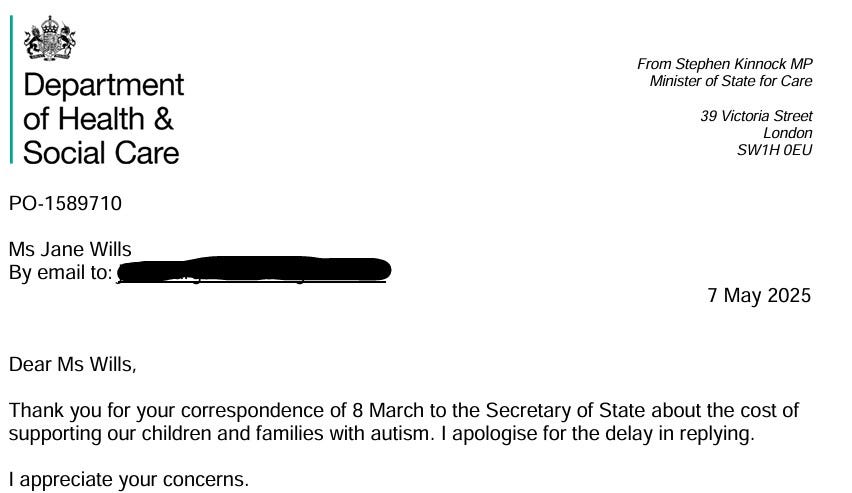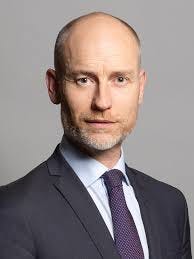Eager readers of the Autism Tribune may remember a post written in early March when the UK government were grappling with the need for cuts in public spending to support a potential war in Ukraine. I shared a letter that was emailed to the Treasury and the Department of Health, highlighting the fact that autism required much greater attention. The current cost of supporting people with autism comes to at least £32 billion a year (LSE data) and the rates of prevalence go up every year (to a global high of 1 in 20 in Northern Ireland at the last count for example). Furthermore, the cost of education and social care is bankrupting our local authorities.
I suggested that the government do more to address the causes and consequences of autism as a way of saving some funds and potentially saving the health of some of the young people who might be expected to fight in their wars. I also suggested that we could follow the lead of the US administration in making the autism epidemic a national emergency.
I am very pleased to report that I have now had a reply from the Right Honourable Stephen Kinnock MP, Minister of State for Care.
I have reproduced the three key paragraphs in what follows below. It provides a very useful overview of government thinking on autism and his words stretch beyond health and care to consider education as well.
Paragraph one:
“I note your concerns about rates of diagnosis of autism. It is apparent that rates of diagnosis, particularly in younger people, have increased in the past few decades. This is likely related to historical under provision, under identification, changes in public and professional awareness, and shifting diagnostic criteria and assessment practices.”
This highlights the extent to which the political and policy community remain complacent about the autism numbers. Rather than getting worried, people repeat the usual platitudes about better awareness, widening diagnostic criteria and greater inclusivity. It usually comes with some fluff about neurodiversity and the marvels of people with clever obsessions. I have written in more depth about this before.
However, more recently and evident here, a newer idea has started to creep in to public debate. This is the one about ‘under-diagnosis’. Rather than worrying about all the people we have already identified as autistic, especially those with very high needs, as well as the ones in the growing queues waiting to be assessed, people are looking for the missing adults. The high numbers of cases of autism in children are seen as ‘normal’ and therefore extrapolated into the adult population where they can barely be found. As a result, experts are looking for all the thousands of adults who must have been missed when they were younger – through what Kinnock calls here ‘historical under provision’. This is the same approach adopted in a recent BBC broadcast called the Autism Curve. I’ve dissected it here but in brief, the commentators interviewed were exercised about all the older people who had been denied the label autistic.
The BBC experts also highlighted those who must have been missed due to the misogyny or racism such that they were given the ‘wrong diagnosis’ in the past, being told they were depressed or psychotic rather than being autistic. This of course presumes that there is some precision about being labelled autistic which of course there isn’t. The only way round this would be to deploy some sort of biomarkers that determine the diagnosis with much greater precision but this would imply there is a biological underpinning to the condition which is certainly not in vogue in current debate!
Paragraph two covered my request to address the causes of autism with a view to its treatment (and ultimately to prevent it happening in future):
“The National Institute for Health and Care Excellence (NICE) is the organisation that provides guidelines for assessing and managing autism. NICE guidelines are developed by experts based on a thorough assessment of the available evidence and extensive engagement with interested parties. The NICE Clinical Knowledge Summary on autism states that the precise cause of autism is unknown, but that genetic factors play a substantial role in the aetiology and a number of environmental factors are also thought to play a part in development. Further information can be found at: https://cks.nice.org.uk/topics/autism-in-adults/background-information/causes-risk-factors/.”
Some readers will know that I have previously mentioned the not-NICE guidelines for children with autism arguing that they reflect an out-dated psychological paradigm in understanding the condition. They are long-overdue an update that reflects the strong science in this field, not least because they tell clinicians NOT to conduct any medical investigations in relation to autism. This is despite the fact that people with autism have a host of ‘comorbid’ conditions that tend to get confused with the symptoms being displayed – such as gastrointestinal problems and pain, neurological inflammation, immune problems (and as readers will know I keep coming back to this list!)
We desperately need NICE and the leading experts who advise them, to change their approach. I would argue that we need a concerted effort to bring together the leading scientists who are working on the biological aetiology of autism and give them a mission to update the official view of the condition (as is happening in the USA). They could then work with clinicians to update the guidelines with NICE. The science points to autism being a manifestation of biological abnormalities rather than being part of the normal diversity found in human behaviour, character and psychology. Anyone parenting a child with severe autism knows the psychological paradigm cannot be the true.
Paragraph three moves on to the crisis in schools:
“I also note your concerns about the special educational needs system. This Government’s ambition is that all children and young people with special educational needs and disabilities (SEND) or in alternative provision receive the right support to succeed in their education and as they move into adult life. The Department for Education is committed to improving inclusivity and expertise in mainstream schools, as well as ensuring special schools cater to those with the most complex needs. This work forms part of the Government’s Opportunity Mission, which will break the unfair link between background and opportunity, starting with giving every child, including those with SEND, the best start in life.”
Readers will know that the country faces a crisis in the provision of specialist education for children with autism and other neurological challenges such as dyslexia, attention deficit (with or without hyperactivity) disorder. I have written about it before. It is clear that the government is going to be making changes to the system in the coming months, likely reducing the onerous paperwork involved in the award of Education Care and Health Plans (ECHPs) for those in most need, putting greater emphasis on inclusion in mainstream schools (which is always preferred as the per capita costs are much lower and in practice, this is already the approach adopted by local authority teams) and reconsidering funding for the growing number of special schools (now numbered just over 1000 in England alone, with plans for more in every part of the land).
So to sum up, this letter provides a very useful summary of where the UK government is positioned in relation to autism in 2025:
1. They acknowledge the numbers are high but are not unduly worried about them such that we need to carry on finding people who aren’t yet diagnosed and who have been discriminated against for not having an autism label!
2. They have outsourced understanding the causes and consequences of the condition and its implications for clinical practice to NICE. This requires the experts who produce clinical protocols issued by NICE to be up-to-speed on the science and its implications for medical practice. Sadly, this is a long way from the current position as laid out in the NICE guidelines for children and adults with autism. This needs an urgent review.
3. They realise that there is a massive problem in educational provision and likely a critical incident going on in every school in the land. Rather than addressing the causes of the problem (the rising numbers and severity of problems involved), they are going to fiddle with existing practice and increase the emphasis on inclusion in mainstream schools. This will do nothing to address the challenges currently faced which are only set to increase. It will likely reduce educational standards and outcomes for neurotypical children. It will have terrible consequences for national productivity and rates of innovation in decades to come. It will also reduce the appeal of the teaching profession, especially for those who have most to offer, which further erodes the quality of learning and leadership in schools. It is a recipe for fiddling while Rome burns to the ground.
The Autism Tribune aims to speak out for the community of children and families living with severe autism. We can’t wish all these problems away or fluff them up in the cotton wool of neurodiversity-speak. The government needs better advisors on this. Our country depends on it. We can’t give up speaking out and writing letters to governments, advisors, newspapers and any outlet that will listen and share.
Thanks for reading and please do share and comment as much as you can.





Ah, the hidden hordes hypothesis redux. There's nothing to see here, folks, because autism has always been this way and there are massive numbers of people with autism that we somehow missed before.
But, of course, that relies on the completely unsupported assumption that autism birth year prevalence has always been the same for all birth years. The papers that claims huge numbers of undiagnosed adults rely completely on that magical assumption without even saying so.
An excellent post Jane. Responses from government ministers (or more accurately their administrators) are rarely satisfactory, reiterating what’s already known while avoiding the concerns being raised. I completely agree that NICE is the problem because the guidelines dictate everything from diagnosis to treatment and remove clinical judgment and autonomy in decision making. Woe betide any clinician who deviates from the guidelines, even if it is in the patient’s best interests and woe betide patients who choose to decline NICE recommended treatment plans as I’ve found out to my peril. NICE undermines all the principles of informed consent which is a matter of huge concern.